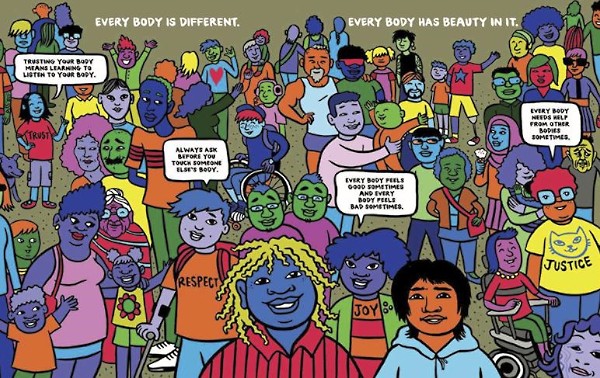“Transformaciones” es el título que le he dado a un grupo numeroso de publicaciones que he recopilado a lo largo de mi vida siendo aficionado a los comics, y que iremos compartiendo paulatinamente dentro de este blog. Algunas de ellas datan de décadas atrás y en los albores del Internet como plataforma de expresión escrita, incluyendo artículos de opinión, entrevistas y contribuciones esenciales en los años mozos de la “blogósfera”, repleta de voces con gran poder y con algo que decir acerca de este hobby que tanto nos apasiona. Todas ellas diseccionan al mundo de los comics desde diferentes aristas y matices. Algunos de ellos representan un retrovisor bastante interesante, y necesario para entender a su evolución como manifestación de las artes y plataforma multi-género.
Sin mayor preámbulo, compartimos un comentario cargado de urgencia y denuncia por la multigalardonada autora G. Willow Wilson sobre la misoginia en la industria del comic profesional.
– – – – – – – – – –
Sex, Gender, and the Comics Industry
G. Willow Wilson
Noviembre 14, 2013.
By now, fans and industry watchers will all have heard about cartoonist Tess Fowler’s (foto) accusations of sexual harassment against acclaimed author Brian Wood—accusations that are part of a much broader (and very fraught) conversation about gender in comics. This is something I care deeply about, so I feel compelled to weigh in. Bear with me.
I have never had a negative or skeevy encounter with a male comics professional. Not one. Not at cons, not at parties, not at meetings, not in green rooms or on panels. In fact, the vast majority of men I’ve met in the industry—including Brian Wood—have been both friendly and generous with their time and influence.
Then again, I dress like a nun. A nun with possible terrorist connections. Who has strabismus. So perhaps I’m not the best example. Nearly every other woman I’ve met in the industry seems to have horror stories about creepy run-ins with male colleagues and creators. In theory, a woman shouldn’t have to look like a strabismic nun with possible terrorist connections in order to be taken seriously in the comics industry, but apparently, that is what it takes.
What can one say? I almost don’t know where to start. When I began to take a serious interest in comics, back in the late 90s-early 00s (when I was literally still a baby… I first manned a booth at SDCC as a 19-year-old intern), misogyny was considered cool. By everybody. Including, it should be mentioned, women. Some of the most popular creators had semi-ironic harems, which when you think about it is not really ironic at all, but nevertheless, irony was used as the justification. I brought up the lack of irony in this ironic arrangement exactly once in an online fan forum and was immediately eviscerated by other women. How stupid was I for failing to differentiate between for-real misogyny, which is bad, bad, and ironic misogyny, which is really just a fun (fun!) way to shine a spotlight on future female creators? Everybody’s gotta start somewhere, right?
Where are these future female creators today?
You have never heard of them.
They were tricked. The casting couch doesn’t work. It was never intended to work. It was a hoax all along. But the great tragedy is that so many women were led to believe that they had to use sex and/or sexuality to make any professional headway. (Pun unin…okay whatever.) They were led to believe that the traditional routes to success (hard work, networking, talent) were literally closed to them.
This is what makes misogyny so pernicious: the tropes are so ingrained that they get buy-in from women themselves. If it was just a matter of naming and isolating the perpetrators of bad behavior, this would be a simple thing. But it’s not enough to remove skeevy guys and lecherous professional favor-traders from the con floors. We also have to remove them from our own inner monologues, from our own sense of self-worth. We have to stop telling ourselves that this is just the way the world works, because it isn’t.
There is nothing a man has to offer a woman professionally that can’t be discussed in a public place. Nothing. If he leads you to believe that you must sleep with him, flirt with him, or be with him behind a locked hotel room door in order to climb the professional ladder, he is lying. If I, the strabismic nun, can sit here waving my 2 Eisner nominations and World Fantasy Award, and be as weird looking and overclothed as I am, then lady, there is nothing you can’t do. On your own terms, by your own merits. Wearing what you like, when you like. End of speech.



